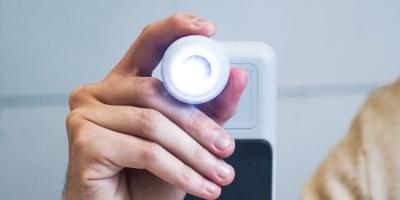MedArrive, a home health and virtual care company, is teaming up with an eye disease screening startup to provide more complex care in patients' homes.
MedArrive providers will use Spect's mobile telemedicine platform to perform critical eye screenings for diseases such as diabetic retinopathy, glaucoma and age-related macular degeneration.
MedArrive is a care management platform that enables healthcare providers and payers to extend services into the home. The company leverages a network of emergency medical technicians, paramedics and other skilled health workers. This allows for improved outcomes while also harnessing the skills of an underutilized segment of the workforce, MedArrive executives said.
The company partners with national Medicaid and Medicare plans to provide to serve vulnerable populations with services span dozens of clinical use cases, including complex condition monitoring, transitional care and readmission prevention, vaccinations and immunizations and medication administration.
The populations that MedArrive serve are at high risk of blindness and other eye diseases because of common comorbidities like diabetes.
"Diabetes is a big area of focus for us and providing a diabetic retinal exam in the home helps to address a key care gap our health plan partners need to close," said Dan Trigub, MedArrive CEO and co-founder, told Fierce Healthcare.
RELATED: Clover Health, MedArrive partner to offer home COVID vaccinations to members
Spect's technology makes treatment more affordable and accessible at the point of care, he added.
Trigub, a former Uber Health executive, and co-founder Inna Plumb launched MedArrive in 2020 as a new care management platform that enables healthcare providers and payers to extend services into the home.
In November, the startup banked $25 million in fresh funding to expand its network and build out its technology.
“We partnered with Spect because its approach to health is incredibly similar to ours: Support patients when and where they need it. The company’s technology will improve the lives of so many of the people who have lacked access to eye care simply because they can’t make it to an in-person appointment," Trigub said.

Diabetes impacts nearly one-third of the U.S. population, and many are affected by its related health complications. Diabetic retinopathy is currently the leading cause of vision loss in American adults, impacting the lives of millions, yet preventable through regular eye check-ups. Despite that, 60% of U.S. patients skip their annual eye exam due to a dearth of appointment availability, lack of at-home care options, and a serious shortage of retinal specialists, according to the companies.
It's estimated that there is only about one ophthalmologist for every 17,000 Americans.
Launched in 2017, Spect uses its telemedicine platform to train medical assistants and render diagnostic reports in minutes, instead of days. Spect's technology makes specialty eye care simple, accessible and affordable by enabling eye diagnostics at home and through primary care providers.
The hardware consists of specialized optics and electronics that enable the camera on the smartphone to take retinal images. Through the partnership, MedArrive providers receive a small, portable, and easy-to-use device to perform retinal screening tests.
The images are graded asynchronously by eye specialists such as ophthalmologists and optometrists, in Spect’s telemedicine network. Spect says its technology enables providers to complete the screening with an image gradeability above 95%.
RELATED: MedArrive nabs $25M to ramp up at-home health services, expand into new states
“If we’re going to tackle health disparities here in The United States, we must ensure that everyone, and I mean everyone, can get the preventative eye care they need,” said Mike Ricci, CEO and co-founder of Spect, in a statement.
“Retinal screening can prevent diabetic retinopathy and give early warnings about heart attack, stroke, Alzheimer's, and Parkinson's. With MedArrive, we’ll be able to seamlessly extend screenings into homes and hopefully start making a dent in the large percentage of people who are missing their exams.”
MedArrive is looking to expand its capabilities with a focus on providing more longitudinal care and leveraging remote patient monitoring technologies as the company bets big on the continued growth of at-home care services, Trigub said.
"There is no question, in our minds, that the future of care is in the home. Hospitals, five to 10 years from now, will have an OR, ER and ICU and all other services will be provided in the home," he said.
He added, "This is a unique opportunity for health plans to extend what they do outside their four walls and they all are beginning to recognize the need to be in the home."